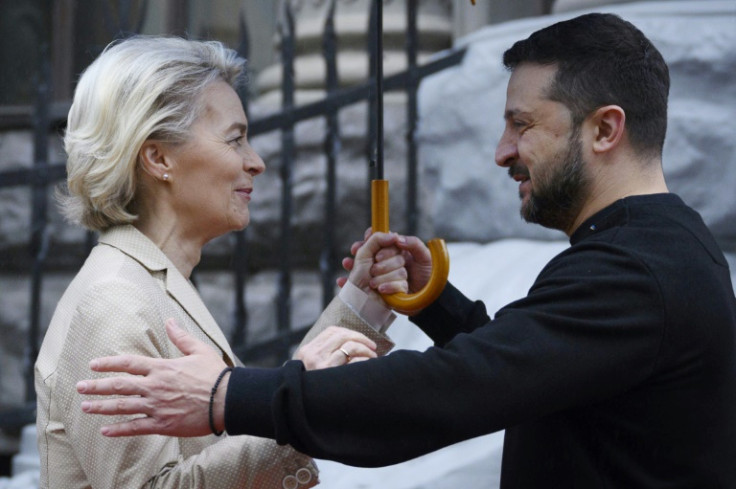Brussels To Report On Opening Door For Ukraine EU Bid

The EU's executive was expected Wednesday to recommend opening formal membership talks with Ukraine and Moldova, nudging them further along the long road to joining.
Ukraine launched its bid to become part of the European Union in the days after Moscow's all-out invasion in 2022, and was officially named a candidate to join last June.
Now the European Commission is delivering its verdict on whether Kyiv has made good on initial reforms, and then it will be for the EU's 27 leaders at a summit in December to decide to start talks or not.
The broad expectation in Brussels is that Ukraine -- along with neighbour Moldova -- will get the commission's backing to move to the next stage, under the proviso they complete outstanding reforms.
Commission chief Ursula von der Leyen has praised Kyiv for completing "way over 90 percent" of seven reform benchmarks Brussels had set, including tackling graft and curbing oligarch power.
"Ukraine will be in the EU," Ukraine's President Volodymyr Zelensky vowed, ahead of what he called the "historic" report.
His foreign minister Dmytro Kuleba said he'd received a "clear signal" from talks in Brussels that Kyiv is heading towards the start of membership negotiations.
But even if war-torn Ukraine does get the nod, it will still only be at the start of a painstaking process of reforms that could last for years -- if not decades -- before it joins the EU.
Turkey began accession talks in 2005, but those are at a dead end. Albania, Montenegro, North Macedonia and Serbia are stuck in negotiations as well.
The war in Ukraine has breathed fresh life into the EU's stalled push to take on new members, as the bloc looks to keep Russian and Chinese influence at bay.
Moldova -- which has complained Moscow is seeking to destabilise it -- lodged its bid to join at the time as Ukraine.
Diplomats from the country say they are "very hopeful" of getting the commission's blessing.
Bosnia became a candidate in December and Georgia is pushing to become one. Both are hoping to get backing from Brussels to progress.
A positive signal from the EU could provide a vital boost to Ukraine at a difficult time when its troops have failed to make a breakthrough and questions grow over continuing US support.
But even diplomats from EU capitals that strongly back Kyiv admit that the debate in December will be tough -- and approval to start talks could be conditional on further reforms.
Allowing in a war-shattered nation of over 40 million people would spell a major shift -- and huge costs -- for the bloc and will turn some countries currently receiving EU funds into net contributors.
Wrapped up with Ukraine's membership push, and those of the other hopefuls, is a far more fundamental debate on how to make the EU manageable if it reaches 30 members or more.
Countries such as the Netherlands insist there can be no shortcuts on the road to membership. Hungary, Russia's closest ally in the EU, accuses Kyiv of curbing the rights of ethnic Hungarians.
"It's obviously heated, difficult -- if it weren't, we'd have a compromise decision already," said one senior European diplomat.
"I'm optimistic that we'll be able to get it done. The problem is that it's not going to be the end of the road, it's likely going to be conditional."
© Copyright AFP 2025. All rights reserved.




















